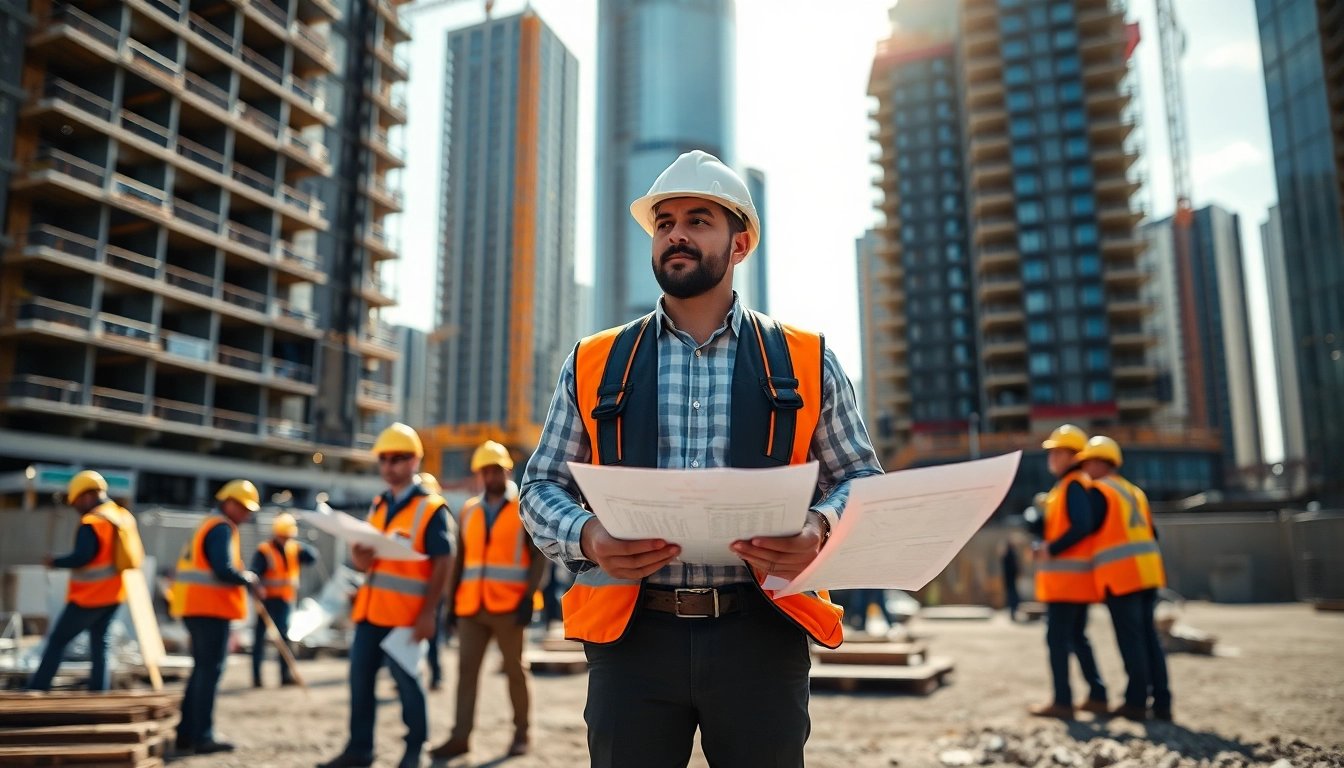The Role of a Manhattan Commercial General Contractor
Understanding Responsibilities and Services
In the vibrant landscape of Manhattan’s commercial construction, the role of a Manhattan Commercial General Contractor is pivotal. These professionals serve as the backbone of any significant construction project, facilitating everything from initial design consultations to the final inspection and turnover of a completed building. Their responsibilities encompass a variety of tasks, including project budget management, scheduling, hiring subcontractors, procurement of materials, and ensuring regulatory compliance with local building codes.
A general contractor in Manhattan must also exhibit a robust knowledge of the city’s unique construction challenges, such as high-density regulations and the intricacies of working within its iconic but space-restricted urban environment. They typically coordinate multiple subcontractors, ensuring that all phases of the project run smoothly and efficiently.
Benefits of Hiring a Manhattan Commercial General Contractor
Engaging a Manhattan Commercial General Contractor can offer numerous benefits, particularly for businesses seeking to build or remodel commercial spaces. Firstly, their expertise translates into enhanced project outcomes. With a deep understanding of local markets, regulations, and construction techniques, these professionals can anticipate challenges and devise effective solutions swiftly.
Moreover, they are skilled negotiators and can often secure better pricing on materials and labor due to established relationships with suppliers and subcontractors. This can lead to significant cost savings for the project. Project timelines tend to be more accurate and reliable when managed by experienced contractors, reducing the risk of delays and ensuring that the project stays on track.
Key Skills to Look for in a General Contractor
When selecting a Manhattan Commercial General Contractor, it is essential to evaluate specific skills and attributes to ensure alignment with your project’s needs. Key skills include:
- Project Management: The ability to plan, execute, and oversee projects efficiently.
- Communication: Strong interpersonal skills to liaise effectively with clients, subcontractors, and suppliers.
- Problem-Solving: Capability to address unforeseen challenges promptly and effectively.
- Financial Acumen: Understanding of budgeting, cost estimation, and financial forecasting.
- Technical Knowledge: Well-versed in the technical aspects of construction, including building codes, safety regulations, and industry best practices.
Choosing the Right Manhattan Commercial General Contractor
Researching and Comparing Options
With numerous options available, choosing the right commercial general contractor in Manhattan requires thorough research. Start by compiling a list of potential candidates. Utilize online resources such as construction forums, industry directories, and local business listings. Take the time to read reviews and testimonials, which can provide insights into past clients’ experiences.
It is also wise to seek recommendations from other business owners who have undergone similar construction projects. Once you have a shortlist, compare the contractors based on their portfolios, qualifications, and areas of specialization. Ensure they have relevant experience specific to your project type, whether it’s retail, office space, or hospitality.
Asking the Right Questions in Interviews
When interviewing candidates, it’s essential to ask pertinent questions that will allow you to gauge their suitability for your project. Inquire about their experience with similar projects, their approach to managing timelines and budgets, and how they handle challenges that may arise during construction. Additionally, ask about their safety protocols and team qualifications to ensure they align with your expectations and industry standards.
It may also be beneficial to discuss their subcontractor relationships, as a general contractor’s ability to leverage trusted subcontractors can directly affect your project’s success.
Evaluating Past Projects and References
Before making a final decision, evaluate the contractor’s past projects. A strong portfolio that showcases a variety of completed work relevant to your needs can be telling of their capabilities. Ask for references and take the time to reach out to past clients. Inquire about their experiences working with the contractor, focusing on areas such as project management, communication, and overall satisfaction with the finished product.
This direct feedback can provide invaluable insights that digital reviews may not entirely convey. Additionally, if possible, consider visiting completed projects to assess the quality of workmanship firsthand.
The Construction Process with a Manhattan Commercial General Contractor
Initial Consultation and Project Planning
The construction process begins with an initial consultation phase, where clients and contractors discuss project goals, budget, timelines, and vision. During this phase, the contractor will gather detailed requirements to create a comprehensive project plan that outlines each stage of the construction process, delineating responsibilities, milestones, and timelines.
This thorough planning is crucial in laying the groundwork for a successful project and helps to minimize potential issues later in the process.
Understanding Budgeting and Cost Estimating
Budgeting is one of the most critical components of any construction project. A proficient Manhattan Commercial General Contractor will prepare a detailed estimate that includes costs for materials, labor, permits, and other expenses. This initial estimate serves as a financial roadmap for the project, allowing clients to understand the cost implications of their decisions early on.
Throughout the project, the contractor will monitor expenditures closely, providing regular updates and adjustments as necessary to keep the project within budget. Transparent communication about costs and potential overruns is essential to maintain trust and manage expectations.
Managing Timelines and Deadlines Effectively
Effective timeline management is vital to ensuring that a project progresses smoothly. A Manhattan Commercial General Contractor will create a detailed schedule that accounts for every stage of construction, from site preparation and groundwork to finishing touches and inspections. They will coordinate the efforts of all subcontractors, ensuring that work is performed in the correct sequence to avoid delays.
Regular check-ins and progress assessments are necessary to ensure that the project remains on schedule. If unforeseen circumstances arise, such as weather-related delays or supply chain issues, a responsible contractor will communicate these challenges promptly and work to mitigate their impact on the project timeline.
Common Challenges Faced by Manhattan Commercial General Contractors
Addressing Budget Overruns in Construction
Budget overruns are a common challenge in construction projects, often resulting from inaccurate estimates, unforeseen site conditions, and changes in project scope. A skilled Manhattan Commercial General Contractor anticipates these issues and builds contingencies into the budget planning phase. They also employ strategies to control costs throughout the project, such as regular budget reviews and maintaining close relationships with suppliers.
When changes are necessary, they will clearly communicate the implications of these changes on both budget and timeline, allowing clients to make informed decisions.
Managing Client Expectations and Communication
Effective communication is fundamental in the contractor-client relationship. Setting realistic expectations from the outset helps avoid misunderstandings later on. A competent Manhattan Commercial General Contractor will establish a clear line of communication, updating clients regularly on progress, challenges, and changes to the original plan.
Besides routine updates, it is valuable for clients to voice concerns or ask questions as the project progresses. This proactive engagement can foster a collaborative atmosphere, ensuring that both parties remain aligned on the project’s goals.
Navigating Regulatory Compliance
Manhattan’s construction landscape entails strict adherence to numerous regulations and zoning laws. A proficient general contractor is well-versed in local regulations and ensures that all necessary permits are obtained before commencing work. They also manage compliance with safety standards and building codes to avoid legal complications that could derail the project.
Regular inspections and adherence to guidelines reduce the likelihood of costly revisions or delays, contributing to the successful execution of the project.
Future Trends in Commercial Construction in Manhattan
Embracing Sustainable Practices and Materials
As environmental consciousness continues to grow, sustainable construction practices are becoming increasingly important in commercial construction. Businesses and contractors alike are shifting toward sustainable materials, energy-efficient designs, and water conservation techniques. The incorporation of green building certifications such as LEED (Leadership in Energy and Environmental Design) is also becoming a notable trend among Manhattan commercial contractors.
Clients are often drawn to contractors who demonstrate a commitment to sustainability, and projects that feature environmentally friendly designs can reduce long-term operational costs and enhance marketability.
Innovative Technologies Shaping Construction
Technological advancements are transforming the construction industry. Innovations such as Building Information Modeling (BIM) enable a more thorough planning process, improving collaboration among team members and reducing errors. Additionally, emerging technologies like drones and augmented reality are enhancing project monitoring and facilitating site inspections.
Adopting these innovative tools can lead to increased efficiency and tighter project oversight, allowing clients to realize their vision more effectively.
Adapting to Market Changes and Client Demands
The commercial construction market in Manhattan is dynamic, driven by shifting client needs, economic fluctuations, and urban development trends. To remain competitive, contractors must stay informed about these changes and adapt their offerings accordingly.
This adaptability may involve specializing in new project types, embracing flexible construction methods, or focusing on enhanced client communication. Compliance with market demands and trends can position a general contractor as a trusted leader in Manhattan’s commercial construction landscape.



